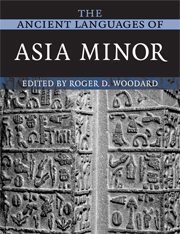Book contents
- Frontmatter
- Contents
- List of figures
- List of tables
- List of maps
- List of contributors
- Notes on numbering and cross-referencing
- List of abbreviations
- Preface
- Preface to the first edition
- 1 Language in ancient Asia Minor: an introduction
- 2 Hittite
- 3 Luvian
- 4 Palaic
- 5 Lycian
- 6 Lydian
- 7 Carian
- 8 Phrygian
- 9 Hurrian
- 10 Urartian
- 11 Classical Armenian
- 12 Early Georgian
- Appendix 1 The cuneiform script
- Appendix 2 Full tables of contents from The Cambridge Encyclopedia of the World's Ancient Languages, and from the other volumes in the paperback series
- Index of general subjects
- Index of grammar and linguistics
- Index of languages
- Index of named linguistic laws and principles
- Map 1 The ancient languages of Anatolia and surrounding regions
1 - Language in ancient Asia Minor: an introduction
Published online by Cambridge University Press: 22 September 2009
- Frontmatter
- Contents
- List of figures
- List of tables
- List of maps
- List of contributors
- Notes on numbering and cross-referencing
- List of abbreviations
- Preface
- Preface to the first edition
- 1 Language in ancient Asia Minor: an introduction
- 2 Hittite
- 3 Luvian
- 4 Palaic
- 5 Lycian
- 6 Lydian
- 7 Carian
- 8 Phrygian
- 9 Hurrian
- 10 Urartian
- 11 Classical Armenian
- 12 Early Georgian
- Appendix 1 The cuneiform script
- Appendix 2 Full tables of contents from The Cambridge Encyclopedia of the World's Ancient Languages, and from the other volumes in the paperback series
- Index of general subjects
- Index of grammar and linguistics
- Index of languages
- Index of named linguistic laws and principles
- Map 1 The ancient languages of Anatolia and surrounding regions
Summary
In his discussion of the philosopher Cleobulus from the Rhodian city of Lindus – at times identified as one of the Seven Sages of ancient Greece – Diogenes Laertius, chronicler of the philosophers, rehearses for his readers the inscription that was carved upon the tomb of the Phrygian King Midas – reported to have been composed by the wise and riddling Cleobulus (though some say it was Homer's work, commissioned by Midas' sons after Homer had lost a poetic contest to Hesiod):
I am a maid of bronze, and upon the tomb of Midas do I lie.
As long as water flows and tall trees bloom and leaf,
And the sun shall rise and shine, and moon so bright,
And rivers run, and the sea shall surge upon the shore,
Remaining here upon his tomb, washed with many tears,
I shall declare to those who pass that here does Midas buried lie.
(Lives of Eminent Philosophers 1.89–90)If Midas' tomb and its inscription shall stand forever, resisting the onslaught of time and testifying to the Phrygian king's existence upon this earth, until earth no longer is, the people over whom this monarch reigned and the language that they spoke would seem to occupy a no less transcendent place in the unwinding of time – at least to judge from Herodotus' report of a discovery that was made in the reign of the Egyptian Pharaoh Psammetichus:
The Egyptians – before Psammetichus ruled over them – considered themselves to be the first of all peoples. Butwhen Psammetichus became king he wanted to find out who was actually the first to exist; and since that time, they have believed the Phrygians to be earlier than themselves, but the Egyptians to be earlier than all others. […]
- Type
- Chapter
- Information
- The Ancient Languages of Asia Minor , pp. 1 - 5Publisher: Cambridge University PressPrint publication year: 2008



